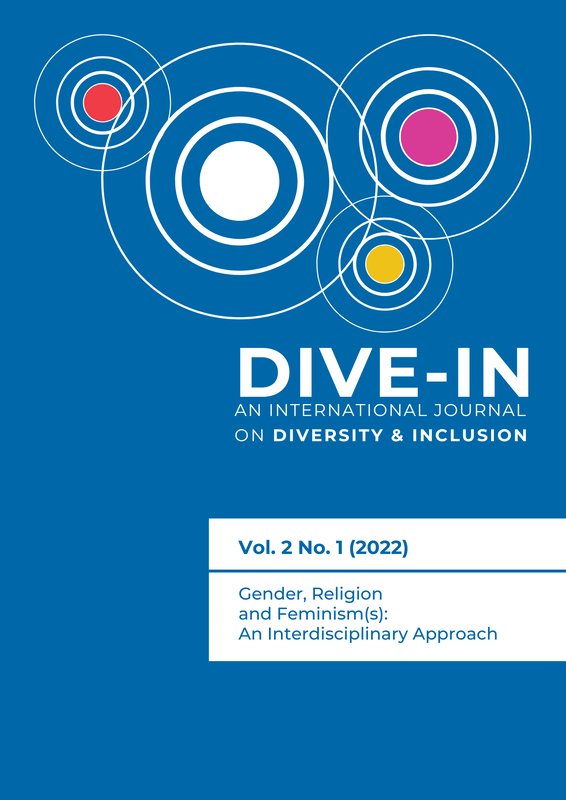“She did not come from his rib”: Questioning Agency and Empowerment in Islamic Feminism
DOI:
https://doi.org/10.6092/issn.2785-3233/16039Parole chiave:
gender, religion, agency, decoloniality, Islamic FeminismAbstract
The aim of this article is to address the Western feminist gaze towards the Muslimwoman, a neologism miriam cooke (2007) invented, which shares the same features of the Third World Woman depicted by Mohanty (1988). The idea is to shed light on productive ways of relating to religion when it comes to Islamic Feminism in particular. My argumentation proceeds as follows: after a brief introduction on the relationship between gender and religion nowadays, as a starting point for my analysis I will illustrate how religion can be employed as a source of agency and its empowering character. Agency has always been conceptualised as a form of resistance and subversion against power, however, other scholars suggest different perspectives. I will introduce and discuss them to deconstruct the idea that every religious woman needs to be saved. I will proceed by deconstructing the “Muslimwoman” neologism to provide a decolonial and intersectional reading of the relationship between gender and religion. To conclude, I will draw from the tools provided by Asma Lamrabet’s reading of the Qur’an to explore the decolonial power of a pious but critical religious practice.
Riferimenti bibliografici
Avishai, Orit. 2008. “‘Doing Religion’ in a Secular World: Women in Conservative Religions and the Question of Agency.” Gender & Society 22(4), 409–433.
Bautista, Julius. 2008. “The Meta-Theory of Piety: Reflections on the Work of Saba Mahmood.” Contemporary Islam 2(1), 75–83.
cooke, miriam. 2007. “The Muslimwoman.” Contemporary Islam 1, 139–154.
cooke, miriam, Fawzia Ahmad, Margot Badran, Minoo Moallem, & Jasmin Zine. 2008. “Roundtable Discussion: Religion, Gender, and the Muslimwoman.” Journal of Feminist Studies in Religion 24(1), 91–119.
Crenshaw, Kimberle. 1990. “Mapping the Margins: Intersectionality, Identity Politics, and Violence against Women of Color.” Stanford Law Review, 43(6), 1241–1299.
Grosz, Elizabeth. 2010. “Feminism, Materialism, and Freedom.” In Diana Coole & Samantha Frost (eds.), New Materialisms. Ontology, Agency, and Politics, 139–157. Durham: Duke University Press.
King, Ursula, & Tina Beattie (eds.). 2005. Gender, Religion and Diversity: Cross-cultural Perspectives. London & New York: Continuum.
Lamrabet, Asma. 2018. Women and Men in the Qur’ān. Translated by Muneera Salem-Murdock. Cham: Palgrave Macmillan.
Mahmood, Saba. 2001. “Feminist Theory, Embodiment, and the Docile Agent: Some Reflections on the Egyptian Islamic Revival.” Cultural Anthropology 16(2), 202–236.
Mahmood, Saba. 2006. “Feminist Theory, Agency, and the Liberatory Subject: Some Reflections on the Islamic Revival in Egypt.” Temenos-Nordic Journal of Comparative Religion 42(1), 31–71.
Mahmood, Saba. 2011. Politics of Piety: The Islamic Revival and the Feminist Subject. Princeton: Princeton University Press.
McLaren, Margaret. A. (ed.). 2017. Decolonizing Feminism: Transnational Feminism and Globalization. New York: Rowman & Littlefield.
Mohanty, Chandra Talpade. 1988. “Under Western eyes: Feminist Scholarship and Colonial Discourses.” Feminist Review 30(1), 61–88.
Rinaldo, Rachel. 2014. “Pious and Critical: Muslim Women Activists and the Question of Agency.” Gender & Society 28(6), 824–846.
Salem, Sara. 2013. “Feminist Critique and Islamic Feminism: The Question of Intersectionality.” The Postcolonialist 1(1), 1–8.
Zine, Jasmin. 2002. “Muslim Women and the Politics of Representation.” American Journal of Islamic Social Sciences, 19(4), 1–22.
Zine, Jasmin. 2016. “Between Orientalism and Fundamentalism: Muslim Women and Feminist Engagement.” In Kim Rygiel & Krista Hunt (eds.), (En)Gendering the War on Terror: War Stories and Camouflaged Politics, 27–49. London & New York: Routledge.
Downloads
Pubblicato
Come citare
Fascicolo
Sezione
Licenza
Copyright (c) 2022 Kamelia Sofia El Ghaddar

Questo lavoro è fornito con la licenza Creative Commons Attribuzione 4.0 Internazionale.





